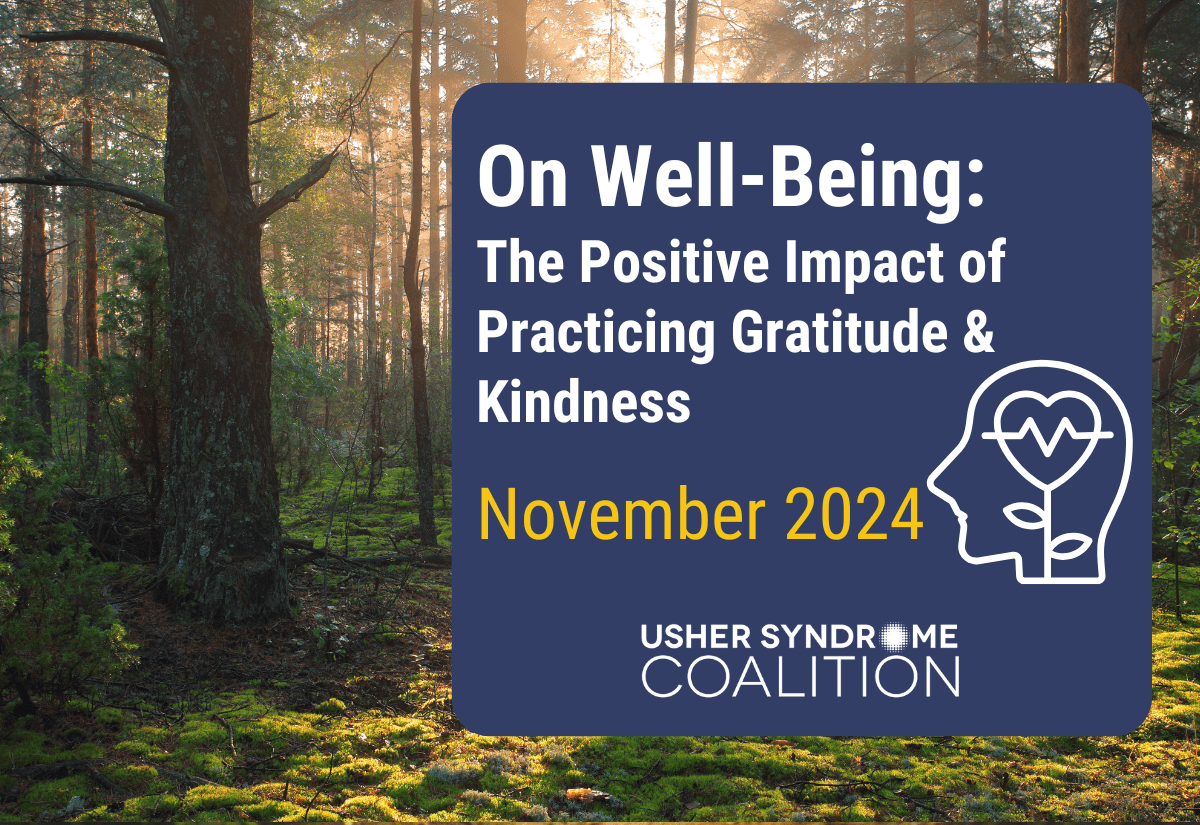
As we approach the season of giving thanks, it can be helpful to remember that gratitude and kindness are simple practices that can have a positive impact on how we feel. Research shows that regularly feeling grateful and doing kind things for others can make us happier and reduce feelings of stress. For people with Usher syndrome, a condition that affects hearing, vision, and balance, these practices can help build inner strength and create a sense of community.
What is Gratitude?
Gratitude means being thankful for the good things in life. This could be people who help us, things that make us happy, or small moments of joy. When we feel grateful, our brain releases chemicals like dopamine and serotonin, which make us feel good (Fox et al 2015). The more we practice gratitude, the more our brain gets used to focusing on the positive things in life. This can help reduce stress and even make us less likely to feel anxious or sad.
One study by Emmons and McCullough (2003) found that people who wrote down what they were thankful for each week felt more positive and slept better. For those with Usher syndrome, practicing gratitude can shift the focus away from the daily challenges and instead highlight support from others and other positive aspects of their lives.
How Kindness Improves Wellbeing
Kindness is about doing something good for someone else, and it benefits both the giver and the receiver. When we do kind things, like helping a friend or volunteering, our body releases oxytocin, also known as the “love hormone.” (Kagan et al, 2014) This makes us feel connected to others and lowers our stress levels.
Kindness often begins with empathy, the ability to understand and share the feelings of others. When we practice empathy, we become more attuned to the needs of the people around us, which encourages kind actions. By recognizing others' struggles and offering support, we create stronger connections and reduce our own stress.
Gratitude and Kindness in the Usher Syndrome Community
For people living with Usher syndrome, gratitude and kindness can be helpful tools to manage the emotional challenges that come with hearing and vision loss. Gratitude can help individuals focus on what they have, like the help they receive from family and friends or the technology that makes life easier. This mindset can reduce frustration and create a sense of peace.
Expressing gratitude to caregivers, interpreters, and advocates who provide support to individuals with Usher syndrome also strengthens relationships. Gratitude helps build a positive attitude, which can make dealing with challenges easier.
Building Resilience with Gratitude and Kindness
Gratitude and kindness don’t just make us feel better in the moment—they help us build resilience, or the ability to keep going through tough times. Focusing on gratitude can help shift attention from challenges to opportunities. For people with Usher syndrome, this might mean feeling grateful for small wins, like learning a new way to communicate or connecting with others in the community.
Tips for Practicing Gratitude and Kindness
Here are some simple ways to practice gratitude and kindness:
- Keep a gratitude journal: Write down three things you're grateful for each day.
- Express thanks: Regularly tell the people in your life that you appreciate them.
- Practice mindfulness: Take time to savor simple pleasures and moments of joy.
- Perform acts of kindness: Help someone, volunteer, or simply compliment a friend.
Gratitude is not just a feeling that comes and goes—it's a choice. You can actively choose to focus on the positive aspects of your life, even when faced with challenges. By focusing on the good things in life and offering kindness to others, you can feel happier, stronger, and more connected to your community.
We are grateful for you and our growing Usher syndrome community.
You are not alone.
References
- Emmons, R.A., & McCullough, M.E. (2003). "Counting blessings versus burdens: An experimental investigation of gratitude and subjective well-being in daily life." Journal of Personality and Social Psychology, 84(2), 377-389. https://pubmed.ncbi.nlm.nih.gov/12585811/
- Fox, G. R., Kaplan, J., Damasio, H., & Damasio, A. (2015). "Gratitude enhances the neural efficiency of the default mode network." Cerebral Cortex, 25(7), 1782-1790. https://pubmed.ncbi.nlm.nih.gov/26483740/
- Kogan, A., Oveis, C., Carr, E. W., Gruber, J., Mauss, I. B., Shallcross, A., Impett, E. A., Van Tongeren, D. R., Brown, K. W., & Cheng, C. (2014). "Vagal activity is associated with generosity." Psychological Science, 25(1), 223-230. http://gruberpeplab.com/pdf/2014_Kogan.Oveis.Carr.Gruber.Mauss.Shallcross.Impett.vanderLowe.Hui.Cheng.Keltner_RSAProsociality.pdf







